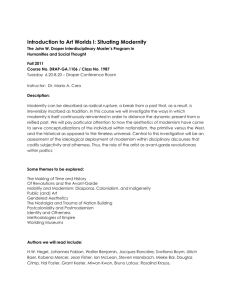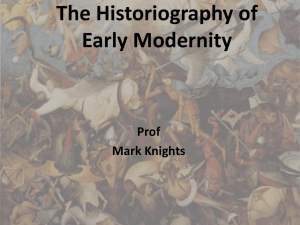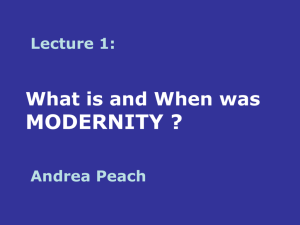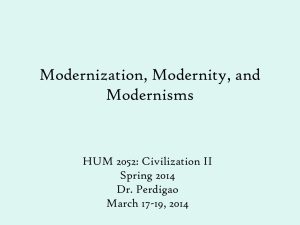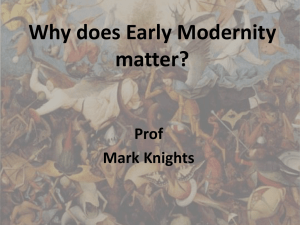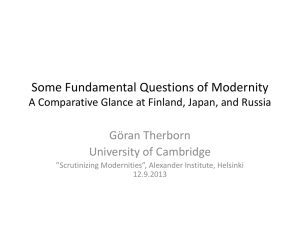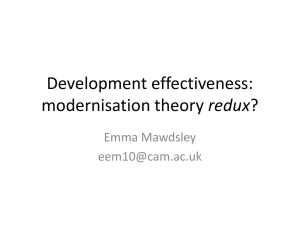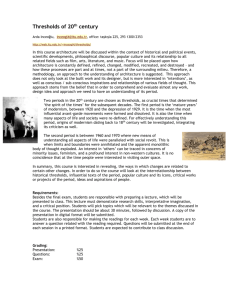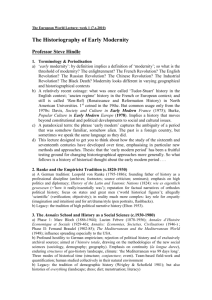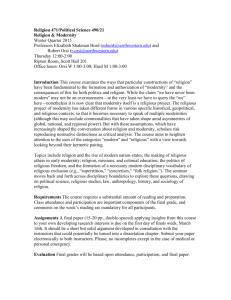module specification
advertisement
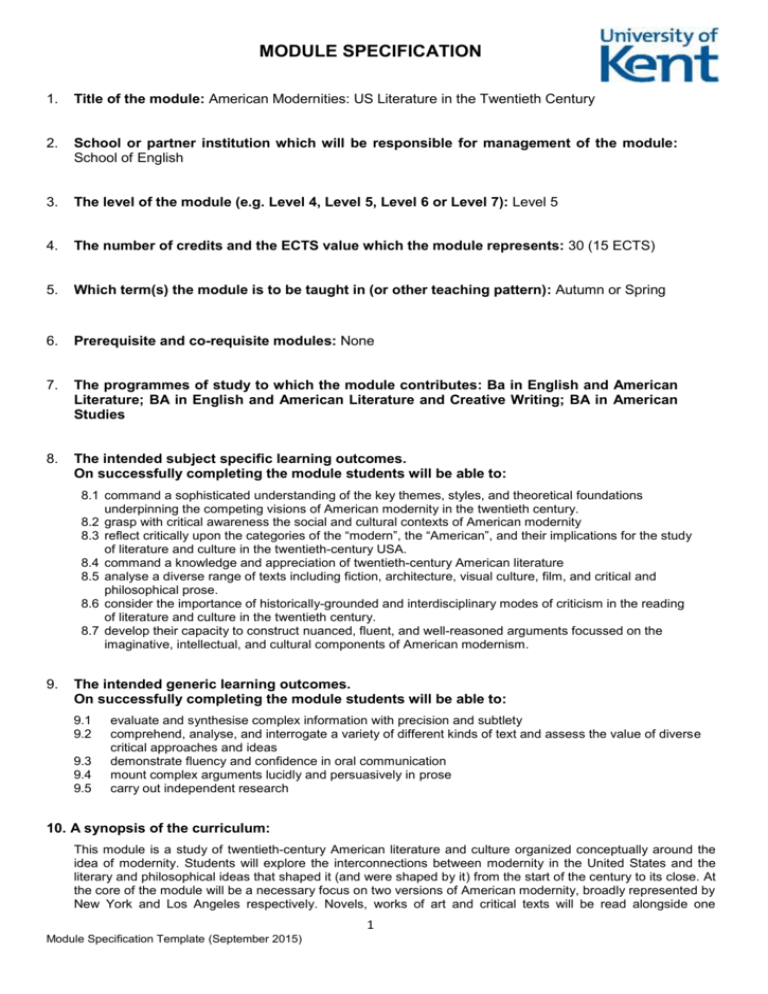
MODULE SPECIFICATION 1. Title of the module: American Modernities: US Literature in the Twentieth Century 2. School or partner institution which will be responsible for management of the module: School of English 3. The level of the module (e.g. Level 4, Level 5, Level 6 or Level 7): Level 5 4. The number of credits and the ECTS value which the module represents: 30 (15 ECTS) 5. Which term(s) the module is to be taught in (or other teaching pattern): Autumn or Spring 6. Prerequisite and co-requisite modules: None 7. The programmes of study to which the module contributes: Ba in English and American Literature; BA in English and American Literature and Creative Writing; BA in American Studies 8. The intended subject specific learning outcomes. On successfully completing the module students will be able to: 8.1 command a sophisticated understanding of the key themes, styles, and theoretical foundations underpinning the competing visions of American modernity in the twentieth century. 8.2 grasp with critical awareness the social and cultural contexts of American modernity 8.3 reflect critically upon the categories of the “modern”, the “American”, and their implications for the study of literature and culture in the twentieth-century USA. 8.4 command a knowledge and appreciation of twentieth-century American literature 8.5 analyse a diverse range of texts including fiction, architecture, visual culture, film, and critical and philosophical prose. 8.6 consider the importance of historically-grounded and interdisciplinary modes of criticism in the reading of literature and culture in the twentieth century. 8.7 develop their capacity to construct nuanced, fluent, and well-reasoned arguments focussed on the imaginative, intellectual, and cultural components of American modernism. 9. The intended generic learning outcomes. On successfully completing the module students will be able to: 9.1 9.2 9.3 9.4 9.5 evaluate and synthesise complex information with precision and subtlety comprehend, analyse, and interrogate a variety of different kinds of text and assess the value of diverse critical approaches and ideas demonstrate fluency and confidence in oral communication mount complex arguments lucidly and persuasively in prose carry out independent research 10. A synopsis of the curriculum: This module is a study of twentieth-century American literature and culture organized conceptually around the idea of modernity. Students will explore the interconnections between modernity in the United States and the literary and philosophical ideas that shaped it (and were shaped by it) from the start of the century to its close. At the core of the module will be a necessary focus on two versions of American modernity, broadly represented by New York and Los Angeles respectively. Novels, works of art and critical texts will be read alongside one 1 Module Specification Template (September 2015) MODULE SPECIFICATION another to explore how these major regional hubs of aesthetic and cultural output developed competing conceptions of “modernity”, “American culture” and the place of “the urban” in twentieth-century life, with important effects on contemporary perceptions of the USA. Moving beyond a sense of “modernism” as simply an aesthetic challenge to nineteenth-century modes of romanticism and realism, to consider the embeddedness of “modernist” literature within the particularities of its cultural and historical moment, students will be asked to develop a more nuanced approach to critical reading that pays close attention to the role of differing conceptions of modernity in the USA. The rise of mass culture, the L.A. film industry, the importance of Harlem to the history of race, the role of the intellectual, the urban challenges of the automobile, the birth of the modern American magazine, and questions of conservation and “creative destruction” in cities will all be considered through readings of key novels and critical texts from what Time Magazine editor Henry Luce famously called “The American Century”. 11. Reading List (Indicative list, current at time of publication. Reading lists will be published annually) Bellow, S. (2007) Mr Sammler’s Planet. London: Penguin Didion, J. (2011), Play It As it Lays. London: Fourth Estate Ellison, R. (2001) Invisible Man. London: Penguin Jacobs, J. (1993) The Death and Life of Great American Cities. London: Vintage, 1993 West, N. (2006), The Day of the Locust. London: Penguin. Wharton, E. (2000) The House of Mirth. Oxford: Oxford University Press Yamashita, K. T. (1997) Tropic of Orange. Minneapolis, MN: Coffee House Press 12. Learning and Teaching methods Total Contact Hours: 30 (10 x 2-hour seminars and 10 X 1-hour lectures) Private Study Hours: 270 Total Study Hours: 300 13. Assessment methods. The module will be assessed by essays of 2500 words each (worth 20% each), of which one of the essays must contain a comparative dimension, on topics set by the module convenor. One three-hour examination (worth 50%). Students will also be expected to make substantial contributions to seminars, including an oral presentation, which will feed into a seminar performance mark (worth 10%) using the established marking criteria. 14. Map of Module Learning Outcomes (sections 8 & 9) to Learning and Teaching Methods (section12) and methods of Assessment (section 13) Module learning outcome 8.1 8.2 8.3 8.4 8.5 8.6 8.7 9.1 9.2 9.3 9.4 9.5 x Learning/ teaching method Hours allocated Private Study 270 x x x x x x x x x x Lecture 10 x x x x x x x x x x 2 Module Specification Template (September 2015) MODULE SPECIFICATION Seminar x x x x x x x x x Coursework essay x x x x x x x x x Seminar Performance/P resenation x x x x x x x x x Examination x x x x x x x x x 20 x x Assessment method x x x x x x 15. The School recognises and has embedded the expectations of current disability equality legislation, and supports students with a declared disability or special educational need in its teaching. Within this module we will make reasonable adjustments wherever necessary, including additional or substitute materials, teaching modes or assessment methods for students who have declared and discussed their learning support needs. Arrangements for students with declared disabilities will be made on an individual basis, in consultation with the University’s/Collaborative Partner’s (delete as applicable) disability/dyslexia student support service, and specialist support will be provided where needed. 16. Campus(es) or Centre(s) where module will be delivered: Canterbury FACULTIES SUPPORT OFFICE USE ONLY Revision record – all revisions must be recorded in the grid and full details of the change retained in the appropriate committee records. Date approved Major/minor revision Start date of the delivery of revised version 3 Module Specification Template (September 2015) Section revised Impacts PLOs( Q6&7 cover sheet)
